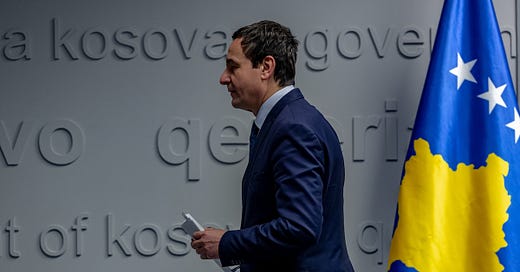How to Topple a Reformer Without Firing a Shot
Kosovo’s Prime Minister resigned to follow the law. His enemies used it to break the system. In the void, a coup bloomed quiet, legal, lethal.
In Kosovo, history does not sleep; it simmers. The recent resignation of Prime Minister Albin Kurti, not as a surrender but as a procedural act to be sworn in anew as a legislator, unfolds against a backdrop of escalating threats and political sabotage that would seem surreal, were it not so gravely real. The failures in Kosovo's parliamentary proceedings on April 15, 2025, were not merely parliamentary technicalities. They were a symptom of a larger illness: a region held hostage by a former regime's shadow and an international community caught in a cycle of denial and appeasement.
When opposition parties like PDK, LDK and AAK, voted against the report that would validate the parliamentary mandates this Tuesday, they cited constitutional and procedural irregularities. But to the discerning eye, it was less about legality and more about stalling a government that has systematically dismantled the oligarchic structures they once presided over. It is a betrayal, not just of politics, but of democracy.
Kurti, in his resignation letter1, reminded the Assembly that his government has been in caretaker mode since March 23, following a full term. This was not a reluctant departure; it was a constitutional necessity to enable his cabinet to enter parliament as deputies. Yet this formality was turned into a farce by those who now weaponise bureaucracy to wage political war.
The roots of this paralysis dig deep into the international corridors of power. The United States, once Kosovo's most resolute ally, found itself caught in an ill-fated romance with Serbia (Biden administration2), a state that signed an agreement to align its foreign policy with Russia in September 20223. One wonders, as a journalist and citizen of a fragile but dignified republic: how has Washington become so easily seduced by the illusion that Serbia can be pried from Moscow’s orbit through appeasement?
As for the Trump administration, what comes next remains shrouded in ambiguity. As of today, there is no appointed U.S. ambassador to Kosovo, an absence that has persisted since Donald Trump returned to the White House on January 20, 2025. Neither President Trump nor Secretary of State Marco Rubio has issued any public statements regarding the state of Kosovo-Serbia relations. This silence is telling. What we do know, however, is that Richard Grenell, Trump’s former envoy and a figure both Serbia-awarded4 and Russian-funded, continues to cast a long, disruptive shadow over the region. His fingerprints are all over what intelligence and credible reports now describe as a second attempted coup5, including an alleged assassination plot targeting Prime Minister Kurti6.
Grenell’s blueprint persists: a relentless campaign to delegitimise Kosovo’s leadership, smear Kurti’s government, and launch coordinated attacks, both rhetorical and structural on Kosovo’s Tribunal in The Hague7. His playbook, dusted off and repurposed, is being executed with a familiarity that should alarm anyone who values democratic stability and judicial integrity8.
In this vacuum of American engagement, Grenell’s influence festers unchecked. It is not just the absence of diplomacy that wounds Kosovo, but the presence of malign actors filling the void. And as history simmers in Kosovo, one cannot help but notice: those who claim to protect democratic values in Washington seem disturbingly comfortable watching them erode in the Balkans.




